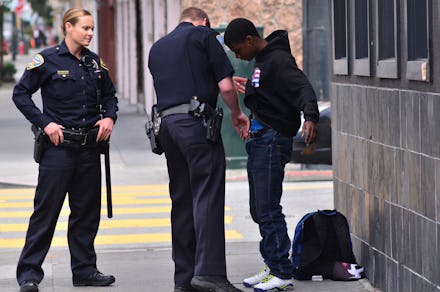This is what stop and frisk is, and why it's unconstitutional

The controversial stop-and-frisk policy instituted by the New York Police Department in 1999 allowed law enforcement to stop any civilian on the street and search their person and belongings. The practice is "allegedly based on reasonable suspicion of criminal activity," the Center for Constitutional Rights explains.
There are just a few problems with that premise: The practice has proven to be racially motivated, ineffective and unconstitutional.
Yet upon being asked in a town hall Wednesday night how he'd tackle black-on-black crime, GOP presidential nominee Donald Trump said stop and frisk was the answer.
"We did it in New York — it worked incredibly well and you have to be proactive," Trump said on Sean Hannity's show, according to NBC News' Alexandra Jaffe.
"I see what's going on in Chicago," he added. "I think stop and frisk in New York City, it was so incredible the way it worked. Now, we had a very good mayor, but New York was incredible, the way that worked, so I think that could be one step you could do."
Why and how is it unconstitutional? On Aug. 12, 2013, in a landmark case, Manhattan Federal District Court Judge Shira Scheindlin ruled stop-and-frisk breached a person's constitutional rights on two counts.
"Judge Shira Scheindlin found the NYPD's practices to violate New Yorkers' Fourth Amendment rights to be free from unreasonable searches and seizures and also found that the practices were racially discriminatory in violation of the Equal Protection Clause of the 14th Amendment," CCR explained.
Subsequently, the NYPD was forced to amend its "policies and training regarding stop and frisk and racial profiling" in accordance with the constitution, according to an internal memo distributed to law enforcement officers.
Between 2002 and 2013, 25% of civilians involved in more than 5 million stops under this practice were young black men. This demographic only accounts for 1.9% of New York City's population, the Washington Post reported.
It has also been well documented that crime levels were not lowered with the introduction of stop and frisk.
Darius Charney, lead counsel in the aforementioned class action lawsuit against NYPD's stop-and-frisk policy and senior staff attorney at CCR, suggested the practice would not be helpful in mitigating black-on-black crime.
"For anybody who wants to address violence in poor, black communities, the most effective way is to tackle poverty, increase economic opportunity and improve education — not to engage in unconstitutional practices," Charney said.
Nonetheless, some iteration of the policy is currently being implemented in a number of other cities, and a major presidential candidate is advocating for more of it.
Sept. 22, 2016, 2:19 p.m. EST: This story has been updated.